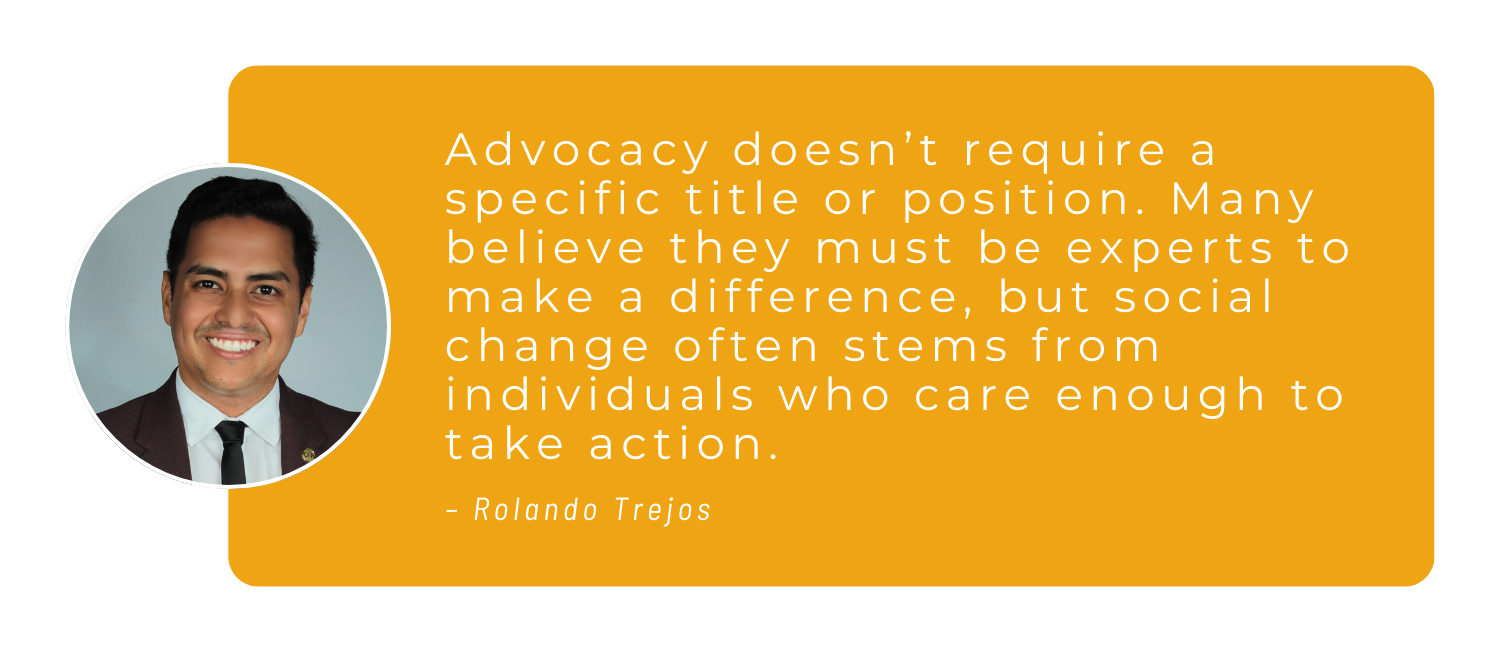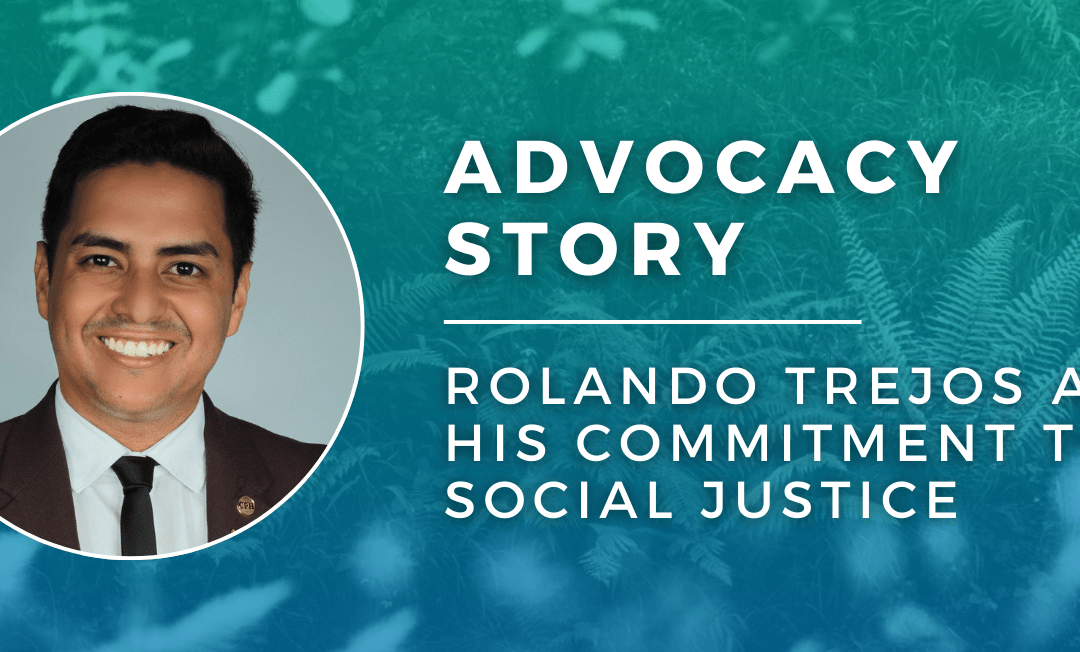The Journey of a Public Health Advocate: Rolando Trejos’ Story
Rolando Trejos is a doctoral candidate at the University of South Florida, where he has advocated for research and policies that support the lives of those in disenfranchised conditions. Trejos’ journey into public health advocacy began by chance, but his drive for social change is rooted in his personal experiences. Growing up in Panama, he recognized early on that societal systems weren’t built to provide the same opportunities to everyone. This realization, paired with his mother’s words, “If you don’t like something, change it,” sparked his involvement in advocacy long before he entered the public health field.
He initially worked with organizations in Panama, Central America, that focused on education, including Ayudinga and the STAR project, which promoted the involvement of women and children in STEM careers. Trejos’ advocacy expanded into social justice work, particularly through Panama’s Human Rights Committee funded by the UN, where he contributed research for evidence-based policies to protect the rights of LGBTQ+ Panamanians. He also worked with TECHO Panama to address housing instability by providing temporary and permanent housing alternatives and advocating for housing policy reforms to protect vulnerable communities from displacement.
These experiences set the foundation for his later role in public health advocacy, driven by a desire to improve the health and well-being of communities affected by structural inequities. From 2018 to 2019, he became involved with the University of South Florida Health Panama Program, his entrée to public health, in which he had the opportunity to advocate for Panama’s citizen science and medical simulation education for health professionals.
Building Bridges Through Public Health: Empowering Communities Through Policy and Research
After moving to the U.S., Rolando Trejos continued his advocacy work, joining the Activist Lab at the University of South Florida. From 2020 to 2023, he served as a student advisory board member and graduate research assistant at the University of South Florida’s College of Public Health Activist Lab, solidifying his commitment to public health as a vehicle for social change. Through his role at the Activist Lab, founded and led by director Karen Liller, PhD, CPH, FAAAS, FAAHB, Trejos worked on over five policy and advocacy projects, many of which received funding from organizations like the American Public Health Association (APHA) and Research! America.
One of the standout projects involved studying the intersection of climate justice and Latino health, particularly in the context of cancer and environmental discrimination. Guided by the lab’s director Dr. Liller, Trejos and his team worked to provide future public health professionals enrolled in high school and college-level programs with the tools to understand how larger systemic factors affected Latino communities. The project, funded by APHA’s Student Champions for Climate Justice award, involved outreach to high school students, engaging them in interactive activities, as well as organizing a symposium with experts at the university level, and other outreach efforts. The research team later presented this work at the APHA Annual Meeting, showcasing how advocacy can lead to social change and inspire others to get involved with organizations working on these critical issues.
Trejos also worked on an important environmental health project funded by Research! America through the Rita Allen Foundation. The project, through the Activist Lab, aimed to create a policy plan centered on equitable environmental health outcomes for Floridians. Trejos stressed the importance of starting by researching people or organizations already engaged in similar work, a key step in advocacy that is often overlooked. By connecting with local academicians and the Environmental Protection Agency, the project provided valuable insights into gaps in existing policies, particularly concerning vulnerable populations such as migrant workers.
The project involved interviews, outreach, and collaboration with legislators, researchers, and environmental agencies. This initiative sought to lay a foundation for how Florida could address environmental disparities, resulting in an environmental health and climate change plan for the State of Florida. A key achievement by Trejos and his team was creating a multi-tiered outreach effort, including a podcast series, to ensure that the project’s impact extended beyond traditional policy work. This approach made advocacy tools accessible to a broader audience, empowering community members to engage in environmental health efforts.

Transforming Advocacy into Social Change
Trejos also highlighted another project, the Adopt-A-School program, developed by Dr. Liller and part of the Activist Lab, to teach advocacy skills to middle and high school students. The program introduced students to advocacy and how to engage in social change at the local and state levels, emphasizing that advocacy is about education, awareness, and providing evidence-based information. He emphasized that while lobbying is focused on specific legislative outcomes, advocacy centers on becoming a resource for communities and policymakers, which can lead to significant social change.
According to Trejos, advocacy doesn’t require a specific title or position. Many believe they must be experts to make a difference, but social change often stems from individuals who care enough to take action. His mentor, Dr. Liller, often recommends, “Find your voice, and advocate for what is right and true.” Lobbying and formal policy work are important, but advocacy can also take many other forms. Everyone has something to contribute, whether through raising awareness or providing evidence-based resources that empower those engaged in the legislative process.
Students, in particular, hold significant power to advocate for change. They can use their unique status to raise awareness about issues and their voices are often heard more clearly than those of established professionals, who may face time constraints and other obstacles. Engaging in activities like writing letters to the editor or contributing to scientific publications can be impactful. As students advocate for specific topics, they help foster social change in their communities and on their campuses.
A valuable lesson Trejos shared from advocacy training is the effectiveness of simple actions, like writing a handwritten letter to a legislator. Such gestures cost little but can generate meaningful awareness about critical issues. Ultimately, it only takes one person to spark change, and everyone possesses a voice that can be used for good. Whether in middle school or just starting a career, using one’s voice to promote health and well-being in a community is a worthy endeavor.
The invaluable support of mentors and colleagues often shapes the advocacy journey. For Trejos, professors like Dr. Karen Liller, Dr. Dinorah Martinez Tyson, Dr. Gabrielle Britton, Dr. Arlene Calvo, Gladys Bernett, and Marlin Gonzalez provided the opportunities and resources that enabled him to advocate effectively. Success is rarely achieved alone, and having a strong network of supportive individuals can make all the difference. Mentorship is key, as many are willing to offer guidance and help newcomers find their footing in the world of advocacy. Persistence is also key, as Trejos puts it, “You’re going to get a lot of ‘no’s’…, but there will be somebody that, when you reach out to them, they will be willing to grab a coffee or just hop into a quick meeting and that may be all that you need to start getting involved and to start bringing about social change in your community.”
Rolando Trejos exemplifies how passion and commitment to social justice can drive meaningful change in public health advocacy. His journey from Panama to the U.S. shows the importance of community engagement, research, and collaboration in addressing disparities. Through his work, Trejos reminds us that effective advocacy does not require formal titles or expertise—what truly matters is the willingness to speak out and empower others. By fostering connections and sharing resources, advocates can amplify their impact and inspire collective action. Reflecting on Trejos’ insights reveals that every effort can contribute to a larger movement for equity and health for all, no matter how small.
–
About the Author
Ursula Oguejiofor is a graduate of the University of North Carolina at Charlotte, where she earned her master’s in public health with a concentration in Epidemiology. Currently serving as an Affiliate Affairs Specialist at the American Public Health Association, Ursula brings a wealth of expertise and dedication to her role.

